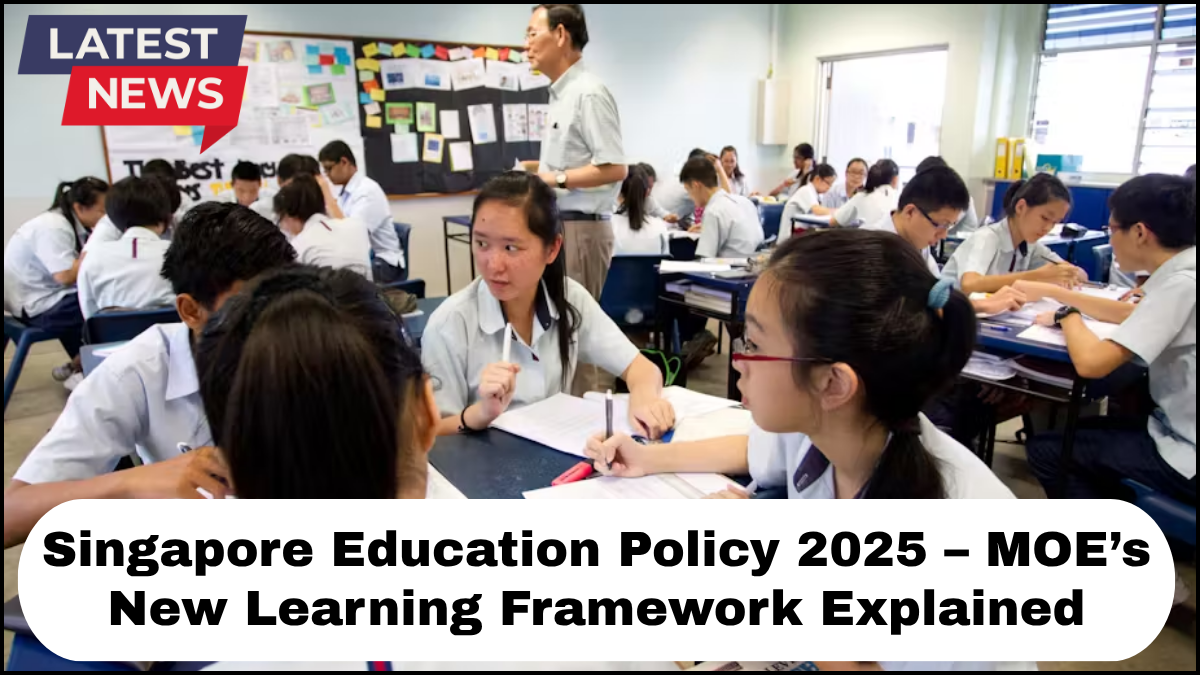Singapore’s Ministry of Education (MOE) has introduced a bold update to its education strategy, set to roll out in 2025. This new direction reflects a deep understanding of the evolving demands of the 21st-century economy, the digital transformation, and the urgent need for more holistic development in students. Dubbed the MOE Learning Framework 2025, this policy represents a significant evolution in how learning will be structured, measured, and delivered.
This article breaks down the key components of the Singapore education policy updates 2025, explores what they mean for students, educators, and parents, and highlights how the MOE learning framework changes will shape the nation’s educational future.

A Shift Towards Lifelong and Lifewide Learning
One of the biggest shifts in the 2025 policy is a move away from content-heavy syllabi to a lifelong learning mindset. The framework emphasizes “lifewide learning,” which means acquiring knowledge and skills from a broader range of experiences — not just in school, but also through community engagement, workplace exposure, and digital platforms.
This shift aims to prepare students for an unpredictable future where adaptability, creativity, and critical thinking are more important than rote memorization. By placing equal importance on non-academic learning, the MOE wants to foster resilient, well-rounded individuals.
Strengthening Core Competencies Beyond Academics
The new policy underscores competency-based learning, focusing on six core areas:
-
Critical and inventive thinking
-
Communication and collaboration
-
Digital literacy
-
Global awareness
-
Self-management
-
Civic literacy
Students will now be assessed not just on what they know but on how they apply knowledge across real-world scenarios. These competencies will be built progressively through customized learning experiences, digital tools, and interdisciplinary projects across primary, secondary, and post-secondary education.
Personalized Learning with AI and EdTech Integration
As part of the MOE learning framework changes, the 2025 update includes a comprehensive integration of artificial intelligence (AI) and data analytics into the classroom. Every student will have access to a personalized learning dashboard, allowing teachers and parents to monitor growth, identify learning gaps, and tailor interventions.
AI tools will help recommend resources based on individual progress and learning styles, while gamified learning apps will keep students engaged and motivated. MOE also plans to expand teacher training to ensure educators are equipped to use these tools effectively.
Redefining Assessments and School Success
High-stakes exams will no longer be the primary indicators of success. The updated framework promotes formative assessments, including digital portfolios, capstone projects, and peer assessments. These tools offer a more comprehensive view of a student’s strengths and potential.
Additionally, the MOE will introduce a new school performance model that values student well-being, co-curricular achievement, and social-emotional growth as much as academic results.
Enhanced Support for Diverse Learners
To ensure equity, the Singapore education policy updates 2025 include expanded support for students with diverse learning needs. This includes:
-
Increased funding for Special Education (SPED) programs
-
Deployment of Learning Support Coordinators in all primary schools
-
More inclusive teaching strategies and Universal Design for Learning (UDL) frameworks
-
Stronger mental health support embedded within school systems
These measures reflect MOE’s commitment to providing every child with opportunities to thrive regardless of background or ability.
Stronger Industry and Community Partnerships
MOE is also opening up the education ecosystem. Schools will work closely with industry leaders, non-profits, and local communities to provide students with authentic learning experiences. For example:
-
Secondary school students may intern with startups or government agencies
-
Primary schools may collaborate with artists or environmental NGOs for service learning
This move ensures that learning is grounded in real-life applications and expands students’ exposure to potential career paths early on.
Teacher Development: The Backbone of the Framework
Recognizing that quality education starts with teachers, the new policy includes significant investment in educator professional development. MOE will roll out:
-
Annual professional learning credits for teachers
-
Mentorship networks across schools
-
Advanced training in AI, digital pedagogy, and coaching
This positions educators not just as knowledge providers but as learning designers, mentors, and facilitators of student growth.
Frequently Asked Questions
What is the main goal of the Singapore Education Policy 2025?
The primary goal is to shift towards holistic education that emphasizes future-ready competencies, personalized learning, and real-world application of skills. It moves beyond academic excellence to include character, creativity, and global awareness.
How will assessments change under the new MOE learning framework?
Assessments will become more diverse and formative. Instead of focusing solely on exams, students will be evaluated through digital portfolios, project-based learning, and reflective journals.
How does this policy support students with special needs?
The 2025 policy includes more funding for Special Education, more inclusive teaching models, and better school-based support systems, including mental health resources and trained learning support staff.
Will technology play a larger role in classrooms?
Yes. AI, learning analytics, and personalized dashboards will be central to the learning experience, helping to tailor education to each student’s strengths and needs.
What are the implications for teachers?
Teachers will receive ongoing professional development and support to implement the new strategies effectively. They will take on more collaborative and facilitative roles in guiding student growth.
click here to learn more